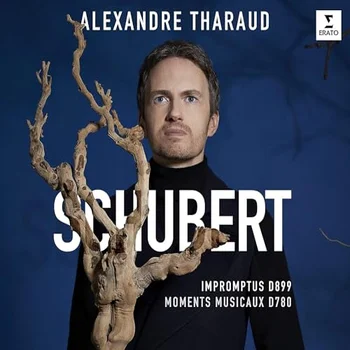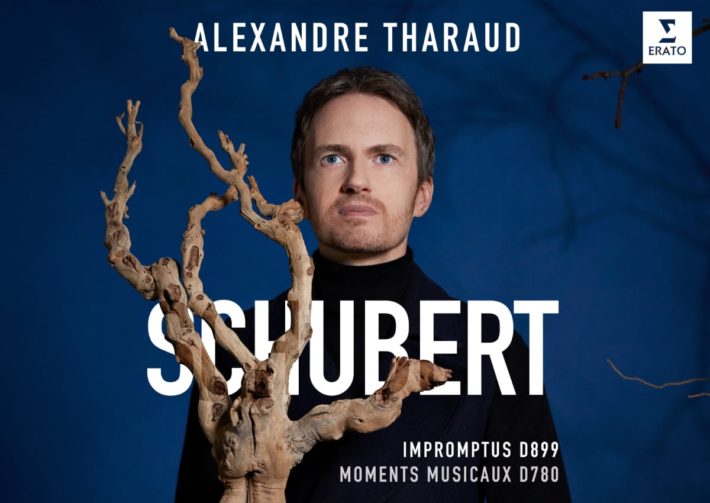Schubert’s D.899 Impromptus are simultaneously unique and cohesive, with some likening the set to a sonata of 4 movements. The four pieces, as well as the six Moments Musicaux we have here, are perfect examples of how effectively the composer could capture a wide range of scenes and sentiments.

The C minor makes for a very fitting introduction that highlights an interplay between austerity and lyricism. Tharaud’s skillfully managed legatos and smooth color shifts give rise to some beautifully expressive moments. The stateliness, however, does not come through as successfully. The opening octave has a rather startling bang and sits a few seconds too long before the theme appears. And where the pianist aims to create some movement in the marchlike textures, an agitation surfaces instead. Phases lean ever so subtly into one another – but where brief silences should speak as loudly as the sounds themselves, the push forward becomes noticeable. To this end, Radu Lupu’s rendition (Decca) gets the balance right: he’s in no hurry, but the rhythmic consistency and nuanced tones better capture the music’s refinement.
The E-flat major (track 2) is the set’s most virtuosic but still has its Schubertian elegance. Subtleties in articulation, however, can be a real make-or-break here: the minutest of changes are capable of unveiling unique characters. With this in mind, I was left somewhat crestfallen despite the effortless playing. A large part of it has to do with the sound engineering: an overwhelming amount of reverb muddies the runs from the outset. Then again, there are also some inexplicable blips in continuity (the most obvious one at 0:12), and just not enough variety. The major and minor runs, for instance, could use far more distinction (something we can hear clearly in Brendel’s versions, enhanced with his scintillating touch). The trio has a bold and expansive sweep thanks to the leaping bass but might do even better with a little more rhythmic snap in the triplet figures.
As in the C minor, Tharaud’s strength in the G-flat impromptu lies in the expressive singing line: His skillful voice-leading reveals the work’s inspiration from the lied genre. Some deliberate rubato and a suspenseful ritardando will also fulfill expectations of those looking for a more dramatic rendition. The A-flat major offers a strong finish to the set: bubbling arpeggios complement the sonorous lower-voice melodies of the outer sections. The rousing middle brings out a vibrant but still tasteful amount of pathos with chords that rumble but do not overpower.
Tharaud revisits the Moments Musicaux after first having recorded them back in the early 2000s. The new performance shows the development of some lovely nuances we hadn’t heard before. In selections like the C major (track 9), the youthful hope in the earlier recording has given way to something more reflective yet lighthearted: the staccato chords now have a little less edge and the phrases are of a mellower contour. The A-flat major Andantino (track 10) has a more sensitive approach as well: an added layer of warmth evokes a meditative quality in the hymn-like opening. Meanwhile, a stinging poignancy underlies the calm of the first minor section (1:08 onwards). The popular F minor (track 11) has some fierce competition: while it doesn’t quite top Curzon’s delightful account, there’s still plenty of refinement to enjoy.
The selections from Rosamunde (transcribed by Tharuad) are a well-thought out addition whose rich sonorities balance out the lighter works elsewhere. Entr’acte No. 3 (track 8) commands our attention in the opening flurry of octaves as well as the furious episodes, but we’re not left bereft of musicality in the melodic passages. There’s also a clever nod to the Impromptus in the thematic connection between Entr’acte No. 3 (track 7) and the D. 935 B-flat.
For the amount of music presented, the liner notes are somewhat sparse, with the lion’s share perhaps rightfully going to the Impromptus. While the album as a whole is a bit hit-or-miss, the finest moments show Tharaud’s artistry – and remind us that we mustn’t forget to appreciate the nuances these works have to offer.
Schubert: Impromptus D.899 & Moments Musicaux D.780
Alexandre Tharaud – Piano
Warner classics, CD 9029659921



















